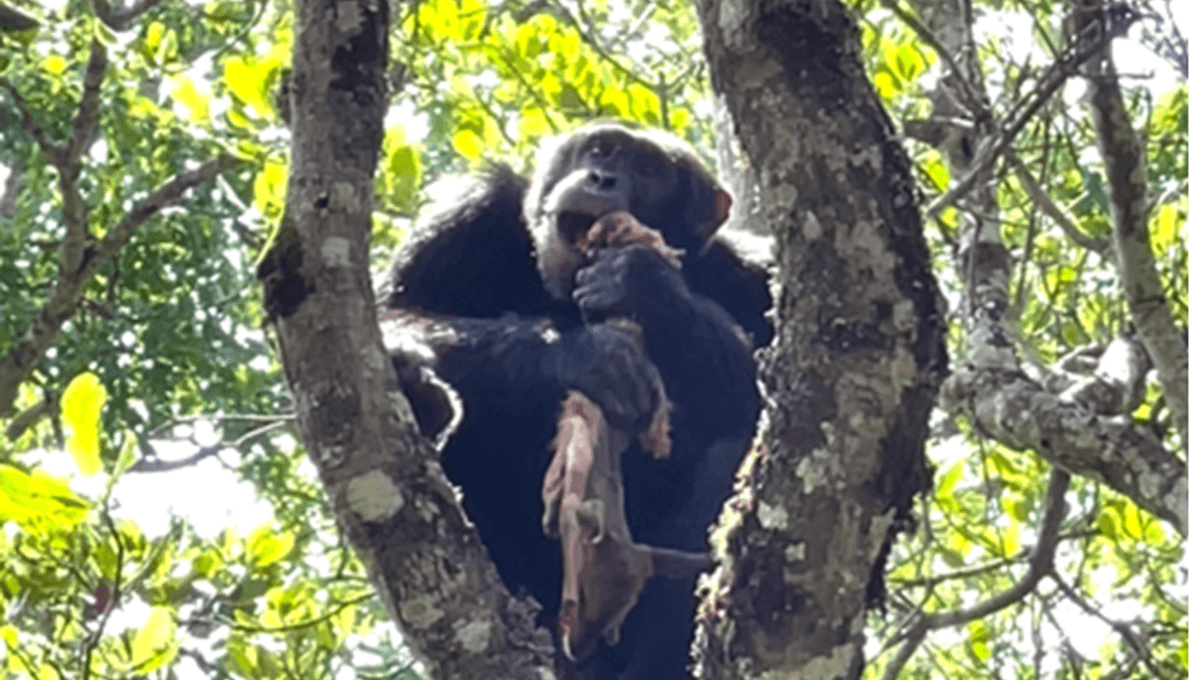
Chimpanzees have been spotted engaging in some extremely rare scavenging behavior in the wild. In Tanzania, researchers watched on as an alpha chimp appeared to snatch the body of a young antelope away from an eagle, before eating its meat with other chimps, stripping the body down to just a skull.
The unusual observation was made in Issa Valley in western Tanzania. This is a rich habitat that’s home to eastern chimpanzees as well as many other species of mammals, including predators like lions, leopards, hyenas, and spotted wild dogs.
Chimpanzees are primarily vegetarians, but they’re known to occasionally consume meat from animals they’ve hunted down themselves. Scavenging like this, however, is very rare.
“East African chimpanzees are endangered and this type of subsistence is very rare. Only specific populations have been observed confrontationally scavenging,” Sam Baker, lead study author and bioanthropologist and University College London, told IFLScience.
The incident unfolded in the early afternoon of October 24, 2021, when Baker and his field assistant were following a party of nine chimpanzees. Suddenly, an alpha chimp called Imba ran out of the thick forest into an open patch of long grass, from which a crowned eagle (Stephanoaetus coronatus) was seen flying away.
The researchers then saw Imba with the carcass of a juvenile bushbuck (Tragelaphus scriptus), a species of antelope native to the area, in his mouth. The altercation was not directly observed, but the scientists believe the eagle must have just hunted the bushbuck and dropped the body as a result of Imba’s intimidating presence.
Imba took his “prize” and climbed up a tree to enjoy the fruits of his labor. Aware of the commotion, the rest of the group followed him and he quickly lost possession of the carcass. Some tusselling broke out and other males vied for the meat, while others begged. At least four individuals were observed consuming the bushbuck.
Eventually, Imba regained possession of the body and finished eating it. After a few hours, all that remained was the bushbuck’s skull.
“The event resulted in the complete consumption of the carcass, supporting the existence of confrontational scavenging in Issa chimpanzees, the first recorded at Issa since habituation was completed in 2018. Crucially, if we acknowledge that chimpanzees are capable of confrontational scavenging, then previously published ‘hunts’ may have been scavenging unseen by human observers who arrived after the event,” the study authors write.
It’s possible this event was purely opportunistic. Alternatively, it might be part of a cultural trait that’s unique to the chimps of Issa.
Either way, the fascinating behavior might shed some light on how and when early humans initially started getting their hands on meat, which may have been a key turning point in their evolution.
As explained by the study authors, previous research “suggests confrontational scavenging provided a vital stepping-stone to hominin hunting − a transition that would propel humans from ‘marginal scavengers’, reliant on the ‘leftovers’ of carnivores, to successful hunter-scavengers proficient in aggressively securing fleshed carcasses from large predators.”
The study is published in the journal Primates.
Source Link: Chimps Seen Snatching An Eagle's Food In A Very Rare Scavenging Encounter